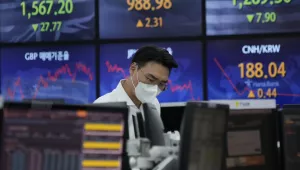The ECB should further ease monetary policy. Inflation at 0.8% across the eurozone is below the target of “close to 2%.” Unemployment in most countries is still high and their economiesweak. Under current conditions it is hard for the periphery countries to bring their costs the rest of the way back down to internationally competitive levels as they need to do. If inflation is below 1% euro-wide, then the periphery countries have to suffer painful deflation.
The question is how the ECB can ease, since short-term interest rates are already close to zero. Most of the talk in Europe is around proposals for the ECB to undertake Quantitative Easing (QE), following the path of the Fed and the Bank of Japan, expanding the money supply by buying the government bonds of member countries. This would be a realization of Mario Draghi’s idea of Outright Monetary Transactions, which was announced in August 2012 but never had to be used.
QE would present a problem for the ECB that the Fed and other central banks do not face. The eurozone has no centrally issued and traded Eurobond that the central bank could buy. (And the time to create such a bond has not yet come.) That would mean that the ECB would have to buy bonds of member countries, which in turn means taking implicit positions on the creditworthiness of their individual finances. Germans tend to feel that ECB purchases of bonds issued by Greece and other periphery countries constitute monetary financing of profligate governments and violate the laws under which the ECB was established. The German Constitutional Court believes that OMTs would exceed the ECBs mandate, though last month it temporarily handed the hot potato to the European Court of Justice. The legal obstacle is not merely an inconvenience but also represents a valid economic concern with the moral hazard that ECB bailouts present for members’ fiscal policies in the long term. That moral hazard was among the origins of the Greek crisis in the first place.
Fortunately, interest rates on the debt of Greece and other periphery countries have come down a lot over the last two years. Since he took the helm at the ECB, Mario Draghi has brilliantly walked the fine line required for “doing what it takes” to keep the eurozone together. (After all, there would be little point in preserving pristine principles in the eurozone if the result were that it broke up. And fiscal austerity by itself was never going to put the periphery countries back on sustainable debt paths.) At the moment, there is no need to support periphery bonds, especially if it would flirt with unconstitutionality.
What, then, should the ECB buy, if it is to expand the monetary base? It should not buy Euro securities, but rather US treasury securities. In other words, it should go back to intervening in the foreign exchange market. Here are several reasons why.
First, it solves the problem of what to buy without raising legal obstacles. Operations in the foreign exchange market are well within the remit of the ECB. Second, they also do not pose moral hazard issues (unless one thinks of the long-term moral hazard that the “exorbitant privilege” of printing the world’s international currency creates for US fiscal policy).
Third, ECB purchases of dollars would help push the foreign exchange value of the euro down against the dollar. Such foreign exchange operations among G-7 central banks have fallen into disuse in recent years, in part because of the theory that they don’t affect exchange rates except when they change money supplies. There is some evidence that even sterilized intervention can be effective, including for the euro. But in any case we are talking here about an ECB purchase of dollars that would change the euro money supply. The increased supply of euros would naturally lower their foreign exchange value.
Monetary expansion that depreciates the currency is effective. It is more effective than monetary expansion that does not, especially when, as at present, there is very little scope for pushing short-term interest rates much lower.
Depreciation of the euro would be the best medicine for restoring international price competitiveness to the periphery countries and bringing their export sectors back to health. Of course they would devalue on their own, if they had not given up their currencies for the euro ten years before the crisis (and if it were not for their euro-denominated debt). Depreciation of the euro bloc as a whole is the answer.
The strength of the euro has held up remarkably during the four years of crisis. Indeed the currency appreciated further when the ECB declined to undertake any monetary stimulus at its March 6 meeting. The euro could afford to weaken substantially. Even Germans might warm up to easy money if it meant more exports rather than less.
Central banks should and do choose their monetary policies primarily to serve the interests of their own economies. The interests of those who live in other parts of the world come second. But proposals to coordinate policies internationally for mutual benefit are reasonable. Raghuram Rajan, head of the Reserve Bank of India, has recently called for the central banks in industrialized countries to take the interests of emerging markets into account by coordinating internationally.
How would ECB foreign exchange intervention fare by the lights of G20 cooperation? Very well. This year the emerging markets are worried about tightening of global monetary policy. The fears are no longer monetary loosening as in the “Currency Wars” talk of three years ago. As the Fed tapers back on its purchases of US treasury securities, it is a perfect time for the ECB to step in and buy some itself.
References
Jeffrey Anderson and Jessica Stallings, “Euro Area Periphery: Crisis Eased But Not Over,” Institute of International Finance, Feb. 13, 2014.
Kathryn Dominguez and Jeffrey Frankel, 1993, Does Foreign Exchange Intervention Work?(Institute for International Economics, Washington, D.C.).
—”Does Foreign Exchange Intervention Matter? The Portfolio Effect,”1993, American Economic Review 83, no. 5, December, 1356-69.
Rasmus Fatum and Michael Hutchison, 2002, ”ECB Foreign Exchange Intervention and the Euro: Institutional Framework, News, and Intervention,” Open Economies Review, 13, issue 4, 413-425.
Marcel Fratzscher, 2004, “Exchange Rate Policy Strategies in G3 Economies,” in C. Fred Bergsten, John Williamson, eds., Dollar Adjustment: How Far? Against What? (Institute for International Economics, Washington, DC).
Stefan Reitz and Mark P. Taylor, 2008, “The Coordination Channel of Foreign Exchange Intervention: A Nonlinear Microstructural Analysis,” European Economic Review, vol. 52, issue 1, January, 55-76.
Lucio Sarno and Mark P. Taylor, 2001, “Official Intervention in the Foreign Exchange Market: Is It Effective and, If So, How Does It Work?” Journal of Economic Literature, 39(3), 839-868.
[A shortened version of this column appears as my March Project Syndicate op-ed. Comments can be posted there.]
Frankel, Jeffrey. “Considering QE, Mario? Buy US Bonds, Not Eurozone Bonds.” March 16, 2014



